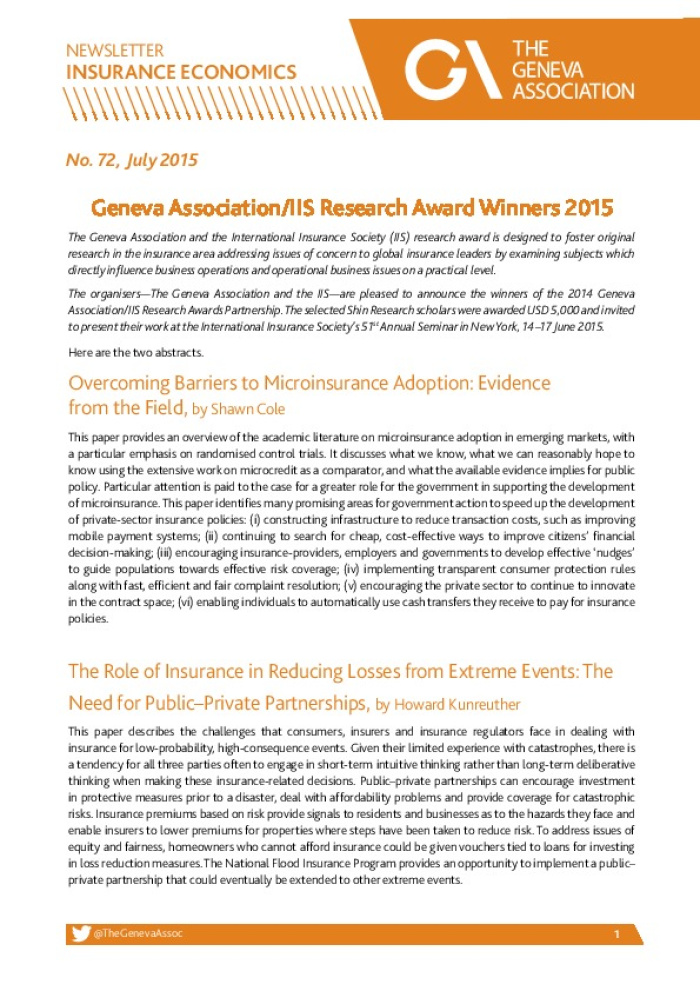Geneva Association/IIS Research Award Winners 2015
Article from Insurance Economics Newsletter No. 72

1 FINANCIAL SBILITY AT ION NEWSLETTER INSURANCE ECONOMICS Geneva Association/IIS Research Award Winners 2015 The Geneva Association and the International Insurance Society (IIS) research award is designed to foster original research in the insurance area addressing issues of concern to global insurance leaders by examining subjects which directly influence business operations and operational business issues on a practical level. The organisers?The Geneva Association and the IIS?are pleased to announce the winners of the 2014 Geneva Association/IIS Research Awards Partnership. The selected Shin Research scholars were awarded USD 5,000 and invited to present their work at the International Insurance Society?s 51 st Annual Seminar in New York, 14?17 June 2015. Here are the two abstracts. Overcoming Barriers to Microinsurance Adoption: Evidence from the Field, by Shawn Cole This paper provides an overview of the academic literature on microinsurance adoption in emerging markets, with a particular emphasis on randomised control trials. It discusses what we know, what we can reasonably hope to know using the extensive work on microcredit as a comparator, and what the available evidence implies for public policy. Particular attention is paid to the case for a greater role for the government in supporting the development of microinsurance. This paper identifies many promising areas for government action to speed up the development of private-sector insurance policies: (i) constructing infrastructure to reduce transaction costs, such as improving mobile payment systems; (ii) continuing to search for cheap, cost-effective ways to improve citizens? financial decision-making; (iii) encouraging insurance-providers, employers and governments to develop effective ?nudges? to guide populations towards effective risk coverage; (iv) implementing transparent consumer protection rules along with fast, efficient and fair complaint resolution; (v) encouraging the private sector to continue to innovate in the contract space; (vi) enabling individuals to automatically use cash transfers they receive to pay for insurance policies. The Role of Insurance in Reducing Losses from Extreme Events: The Need for Public?Private Partnerships, by Howard Kunreuther This paper describes the challenges that consumers, insurers and insurance regulators face in dealing with insurance for low-probability, high-consequence events. Given their limited experience with catastrophes, there is a tendency for all three parties often to engage in short-term intuitive thinking rather than long-term deliberative thinking when making these insurance-related decisions. Public?private partnerships can encourage investment in protective measures prior to a disaster, deal with affordability problems and provide coverage for catastrophic risks. Insurance premiums based on risk provide signals to residents and businesses as to the hazards they face and enable insurers to lower premiums for properties where steps have been taken to reduce risk. To address issues of equity and fairness, homeowners who cannot afford insurance could be given vouchers tied to loans for investing in loss reduction measures. The National Flood Insurance Program provides an opportunity to implement a public? private partnership that could eventually be extended to other extreme events. No. 72, July 2015 @TheGenevaAssoc INSURANCE ECONOMICS